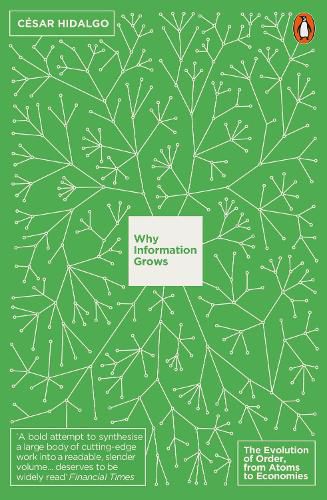Readings Newsletter
Become a Readings Member to make your shopping experience even easier.
Sign in or sign up for free!
You’re not far away from qualifying for FREE standard shipping within Australia
You’ve qualified for FREE standard shipping within Australia
The cart is loading…






In Why Information Grows, rising star Cesar Hidalgo offers a radical interpretation of global economics
What is economic growth? And why, historically, has it occurred in only a few places? Previous efforts to answer these questions have focused on institutions, geography, finances, and psychology. But MIT professor Cesar Hidalgo argues that in order to fully grasp the nature of economic growth we need to transcend the social sciences and turn to the science of information, networks and complexity. The growth of economies, he explains, is deeply connected with the growth of order - or information.
At first glance, the universe seems hostile to order. Thermodynamics dictates that over time, order will disappear. But thermodynamics also has loopholes that promote the growth of information in pockets. Our cities are such pockets where information grows, but they are not all the same. For every Silicon Valley, Tokyo, and London, there are dozens of places with underdeveloped economies. Why does the US economy outstrip Brazil’s, and Brazil’s that of Chad? Why did the technology corridor along Boston’s Route 128 languish while Silicon Valley blossomed? In each case, the key is how people, companies, and the networks they form process information - it is all about their knowledge, knowhow and imagination. As Hidalgo compellingly shows, economies are made of networks of people and society is a collective computer. The problem of economic development is in fact the problem of making these networks more powerful.
A radical new interpretation of global economics, Why Information Grows overturns traditional assumptions about the development of economies and the origins of wealth and takes a crucial step toward making economics less the dismal science and more the insightful one.
$9.00 standard shipping within Australia
FREE standard shipping within Australia for orders over $100.00
Express & International shipping calculated at checkout
In Why Information Grows, rising star Cesar Hidalgo offers a radical interpretation of global economics
What is economic growth? And why, historically, has it occurred in only a few places? Previous efforts to answer these questions have focused on institutions, geography, finances, and psychology. But MIT professor Cesar Hidalgo argues that in order to fully grasp the nature of economic growth we need to transcend the social sciences and turn to the science of information, networks and complexity. The growth of economies, he explains, is deeply connected with the growth of order - or information.
At first glance, the universe seems hostile to order. Thermodynamics dictates that over time, order will disappear. But thermodynamics also has loopholes that promote the growth of information in pockets. Our cities are such pockets where information grows, but they are not all the same. For every Silicon Valley, Tokyo, and London, there are dozens of places with underdeveloped economies. Why does the US economy outstrip Brazil’s, and Brazil’s that of Chad? Why did the technology corridor along Boston’s Route 128 languish while Silicon Valley blossomed? In each case, the key is how people, companies, and the networks they form process information - it is all about their knowledge, knowhow and imagination. As Hidalgo compellingly shows, economies are made of networks of people and society is a collective computer. The problem of economic development is in fact the problem of making these networks more powerful.
A radical new interpretation of global economics, Why Information Grows overturns traditional assumptions about the development of economies and the origins of wealth and takes a crucial step toward making economics less the dismal science and more the insightful one.